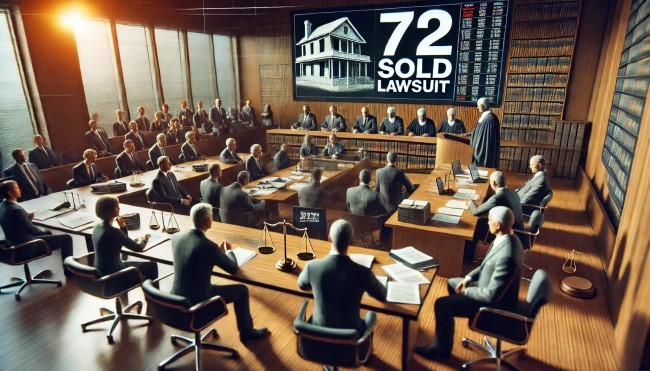72 Sold Lawsuit: Uncovering the Truth Behind Real Estate’s Most Controversial Case
A Deep Dive into the Allegations, Legal Ramifications, and Industry Impact

The 72 Sold lawsuit has brought significant attention to the real estate industry, raising severe allegations of false advertising and deceptive business practices. The plaintiffs claim that 72 Sold, a company promising to sell homes within 72 hours, has misled clients with unrealistic expectations and undisclosed fees. This lawsuit could lead to increased regulatory scrutiny and a potential reshaping of real estate marketing practices. This case is pivotal, challenging the balance between innovative business models and consumer protection.
Introduction
The 72 Sold lawsuit has emerged as one of the most talked-about legal battles in the real estate sector. It challenges the practices of a company that once promised to revolutionize home selling. This article will explore the critical details of the lawsuit, the parties involved, the implications for the real estate industry, and the broader context of consumer protection and legal accountability.
The Origins of 72 Sold: A Revolutionary Concept
Founded in 2018 by Greg Hague, 72 Sold marketed itself as an innovative solution for homeowners looking to sell their properties quickly. The company promised to sell homes within 72 hours, an attractive proposition that quickly gained traction. Partnering with Keller Williams, a prominent real estate brokerage, 72 Sold expanded its operations across the United States, particularly in Arizona, where it was founded.
Allegations Against 72 Sold
The lawsuit against 72 Sold is rooted in severe allegations at the core of the company’s business model. The plaintiffs claim that the company engaged in false advertising and failed to consistently deliver on its promise of selling homes within the advertised timeframe. In many cases, homes allegedly took much longer to sell, and when they did, it was often at a price below market value.
Misleading Advertising and Unrealistic Promises
The lawsuit’s heart is the accusation that 72 Sold’s marketing materials created unrealistic seller expectations. The company’s promise to sell homes within 72 hours, or even within eight days, is seen as a tactic to lure clients under pretences. The plaintiffs argue that this promise was rarely fulfilled and led to financial harm for many sellers who relied on these assurances.
Deceptive Business Practices and Hidden Fees
Beyond the advertising claims, the lawsuit also accuses 72 Sold of deceptive business practices. The plaintiffs allege that the company’s contracts often needed more precise and included hidden fees not disclosed upfront. High-pressure sales tactics were reportedly used to quickly push clients into signing contracts without giving them adequate time to review the terms. These practices have left many clients feeling misled and financially burdened.
The Legal Proceedings: Who Is Involved?
The lawsuit names several critical figures associated with 72 Sold, including its founder, Greg Hague. Other defendants include key individuals from Keller Williams and other entities connected to 72 Sold’s operations. The legal battle has drawn attention from the real estate community, regulatory bodies, and consumer protection agencies, all of whom are closely monitoring the proceedings.
The Role of Keller Williams
As a partner of 72 Sold, Keller Williams has also been implicated in the lawsuit. The allegations extend to how the partnership may have influenced the broader business practices of both companies, particularly in how fees were structured and collected. This has led to a deeper investigation into the operational integrity of these real estate giants.
Potential Implications for the Real Estate Industry
The 72 Sold lawsuit could have far-reaching implications for the real estate industry, especially regarding how real estate services are marketed and sold. If the plaintiffs are successful, it may lead to stricter regulations on advertising practices, requiring companies to be more transparent and honest in their claims.
Regulatory Scrutiny and Changes in Industry Practices
The outcome of this lawsuit could prompt regulatory bodies to impose stricter guidelines on real estate advertising. Companies may be required to provide more substantial evidence of their claims and refrain from making bold promises that cannot be guaranteed. This could lead to a more conservative approach in real estate marketing, focusing on transparency and accuracy.
Consumer Protection and Awareness
This case highlights the importance of consumer protection in the real estate market. Sellers must diligently research and understand the services they are contracting for, ensuring that all terms and conditions are clearly understood before signing any agreements. The lawsuit serves as a reminder of the need for vigilance and due diligence when engaging with real estate companies.
The Defense from 72 Sold
In response to the allegations, 72 Sold has vigorously defended its business practices. Greg Hague and his legal team argue that the company’s marketing is truthful and that the 72-hour sale is presented as a goal rather than a guarantee. They maintain that all terms and conditions are clearly outlined in the contracts and that most of their clients are satisfied with the service.
Client Satisfaction and Testimonials
Despite the lawsuit, 72 Sold points to numerous positive testimonials and reviews from clients who have successfully sold their homes through the program. The company argues that the negative experiences highlighted in the lawsuit are outliers and do not represent the overall success of the business model.
Broader Legal and Ethical Considerations
The 72 Sold lawsuit also raises broader legal and ethical questions about the balance between innovation and regulation in the real estate industry. As companies like 72 Sold, push the boundaries of traditional real estate practices, ensuring that such innovations do not come at the expense of consumer rights and protections is necessary.
The Future of 72 Sold: Possible Outcomes and Industry Impact
As the lawsuit progresses, several potential outcomes exist, each with different implications for 72 Sold and the real estate industry. A settlement could involve changes to 72 Sold’s marketing and business practices, while a court ruling could either validate or condemn the company’s methods.
Potential Settlements or Verdicts
The possibility of an out-of-court settlement must be considered. Such a resolution would allow for a quicker conclusion to the legal proceedings while minimizing the risks and costs associated with prolonged litigation. However, the terms of any settlement reached or the verdict delivered will have significant implications for 72 Sold, its stakeholders, and the broader real estate industry.
Conclusion: Lessons Learned and the Path Forward
The 72 Sold lawsuit is a critical reminder of the importance of transparency, honesty, and ethical conduct in the real estate industry. As the case unfolds, it will likely influence how real estate companies operate, market their services, and engage with consumers in the industry. Regardless of the outcome, this lawsuit is a pivotal moment that underscores the need for a careful balance between innovation and consumer protection.
Final Thoughts
The real estate industry is at a crossroads, and the 72 Sold lawsuit signals that change is needed. Whether through legal reform, regulatory oversight, or shifts in business practices, the lessons learned from this case will shape the future of real estate in the United States. All eyes are now on the courtroom, where the battle over truth, transparency, and trustworthiness in real estate unfolds.



